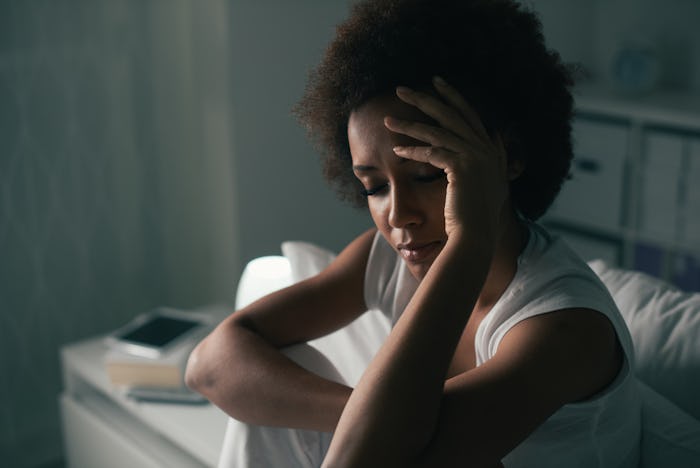Life
This App For Postpartum Depression Could Be A Lifesaver For Moms
Six-hundred thousand women in the United States experience postpartum depression each year, according to Postpartum Progress. It's a staggering statistic, especially when you consider postpartum depression can be hard to diagnose and that a lot of women lack access to health care services. Although there is a still a lot of work to be done to help moms with postpartum depression, Massachusetts General Hospital just developed a new iPhone app that screens for postpartum depression. The best part? It's totally free.
For many new parents, it can be hard to differentiate between postpartum depression and normal stress. Often times postpartum depression is dismissed or misdiagnosed as "baby blues" because the two often present somewhat similar symptoms. The main difference between the two, however, is that postpartum depression can linger on for years without treatment, while baby blues typically last only a few months, according to Cafe Mom. Furthermore, the symptoms of PPD are often more extreme in nature — some parents might feel "worthless" or they may even experience thoughts of self-harm, according to Fit Pregnancy.
Although the distinction between baby blues and postpartum depression is often clear to doctors, it can be difficult for a parent to self-diagnosis. So, it's safe to say things can get pretty tough for a parent who can't afford regular doctor appointments or consultations. How do you know if you have postpartum depression if you can't afford a doctor? With this question in mind, Massachusetts General Hospital decided to create a free iPhone app that screens parents for postpartum depression.
The app, called the MGH Perinatal Depression Scale (MGHPDS), "includes questionnaires about mood, anxiety, sleep, and stress at important time points during pregnancy and the postpartum period," according to iTunes. The app's clear and concise questions will help women between the ages of 18 and 45 see "where they fall on the spectrum of the symptoms of postpartum depression," according to ABC News.
Dr. Lee S. Cohen, director of the hospital’s Ammon-Pinizzotto Center for Women’s Mental Health and professor of psychiatry at Harvard Medical School, said of the app, according to ABC News:
We view this as so intuitive from a public health point of view given the prevalence of postpartum depression in the population. Using apps is part of the fabric of people's day to day lives. A woman can fill out a screen, see what the score is and get a prompt about the result and then have a resource page on the app to help them.
Obviously, the MGHPDS is a big deal — women without access to health care can get a trusted postpartum screener with just one download. Although the MGHPDS screener has been available online for some time now, its development into an app signals a significant shift in how health care providers might service uninsured parents in the future. An app could be the easiest and most affordable way for a person to get something close to a diagnosis if they can't access a medical professional.
As for Cohen's future goals for the app, she revealed, according to Medical Xpress:
Those who download the app and complete the included questionnaires may also consent to share their scores with researchers within our center here at MGH, further assisting in the development of an even shorter scale with greater specificity than what is currently available. It is our hope that — as screening for PPD becomes increasingly common across the U.S. and globally — easy-to-use tools like the MGHPDS, which can be readily used on smartphones and other digital devices, will lead to more accurate screening of perinatal mood and anxiety disorders and to improved clinical outcomes for patients.
Although it's incredible to think of all the parents the MGHPDS app can help, the app doesn't answer the question of what parents should do if they are diagnosed with postpartum depression. If you struggle with postpartum depression and you don't have health insurance, consider joining a postpartum depression support group. Moms who might be struggling can also call a crisis hotline — according to Postpartum Progress, "some states offer crisis hotlines specific to postpartum depression."
Going forward, hopefully more apps like MGHPDS will be developed — it goes without saying that every parent deserves medical support and help.
